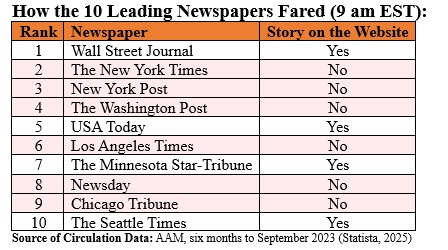PRINT AS PDF
In the early hours of November 18, 2025, Internet-infrastructure provider Cloudflare experienced a global outage that knocked out access to a wide range of online services, including platforms such as ChatGPT and X. The disruption stemmed from an “unusual traffic” spike that triggered internal service degradation and widespread 500-error messages across sites reliant on Cloudflare’s network. Although many services were restored quickly, the incident underscored the vulnerability of critical web infrastructure and the ripple effects when a central node fails.
The fast-moving Cloudflare outage, an infrastructure failure that temporarily knocked high-profile websites offline, including OpenAI’s ChatGPT, served as a revealing test of how quickly major newsrooms can react to breaking digital events. While some outlets moved swiftly, several prominent legacy brands failed to post any reference to the story on their webpages even three hours after the disruption began. Among the organizations that had not reported on the outage during that window were the The Los Angeles Times, The New York Times, and The Washington Post. In fact, none of the major newspapers in the New York City area—The New York Times, New York Daily News, New York Post, or Newsday carried the story three hours into the outage. In contrast, the Boston market was well-served, as both The Boston Globe and Boston Herald reported on the story.
In an era of round-the-clock digital news, the lag in coverage raised questions about newsroom capacity, readiness, and agility to report on fast-moving developments.
This pattern of delayed or sparse coverage occurred amid shifting patterns in news consumption. According to the Pew Research Center, only 56 % of U.S. adults now say they have “a lot or some” trust in information from national news organizations. Meanwhile, Pew also revealed that 21% of U.S. adults now regularly receive their news from social media news influencers with 54% citing “quick reporting on breaking news” as a “major reason” and another 31% citing it as a “minor reason.”.
The Cloudflare outage was more than an infrastructure failure. It was the latest stress test for a news industry already grappling with declining trust and a rapidly fragmenting audience. In a moment when tens of millions of people were suddenly locked out of essential digital services, too many newsrooms proved slow to recognize the magnitude of the story unfolding in real time. If traditional news organizations hope to remain trusted and relevant sources of information, they must rebuild the speed, situational awareness, and digital fluency that today’s audiences expect. The public will not wait for news that arrives hours late, if at all.



